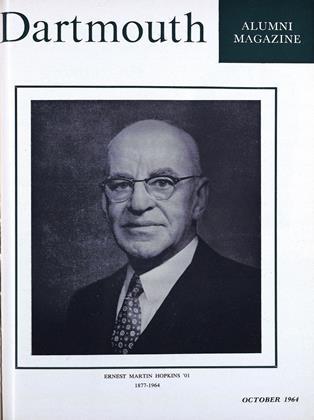NewYork: McGraw-Hill Book Co., 1964. 411pp. $7.50.
If it appears from his autobiography that Vilhjalmur Stefansson led two lives — in tandem, not simultaneously — it is but a proper reflection of a man who was in reality two persons. The first of these was the intrepid Arctic explorer - archetype of pre-World War heroes whose adventures in the high latitudes tingled pleasantly the spines of thousands as they sat reading by their warm hearths. Boundless courage, inexhaustible energy and a resourcefulness which drew the fangs of the far north - all these converted Stefansson's name to a household word by the time he was 40. During a dozen years (1906-1918) spent almost constantly in the Arctic he pushed outward, with his own hands and heart, the northern extremity of man's knowledge.
Thereafter his theater of operation shifted largely to the temperate zone of North America where for more than 40 years, in the United States and Canada, he consolidated and imparted his discoveries to the great and enduring profit of mankind. Though the second half of Stefansson's career may lack the cliff-hanging elements of the first, the life of the mind is no less absorbing as he delineates and unfolds it. One rejoices that the , explorer was also the scholar, qualified to weave permanently into the fabric of man's lot the meaning of his discoveries.
Endowed with a flare for showmanship Stefansson, through his lectures and writings, succeeded in creating and sustaining among many a sense of excitement and wonderment about the future of the far north. He deemed this essential to rapid public acceptance of that future. Despite inertia, and indeed suspicion among laymen and others who should have known better, Stefansson's revolutionary concepts began to catch hold, expedited to be sure by the additional prospect of critical military importance of the north polar region. He lived to see himself accepted as a prophet.
Should one, in following the course of this autobiography, find himself occasionally restive at the author's unfaltering confidence in the validity of his own perceptions, let one reflect that it was part of Stefansson's deliberate tactic to "rejoice in his own works." If he had not been prepared to do so perhaps their benefits would have moved more slowly into the life stream of northern conquests.
The last years of Stef's life have a special meaning for all Dartmouth men. In 1951 he brought to Hanover from New York his fabulous library on the polar regions which, through the generosity of Albert Bradley '15, and of Stef himself, became the property of the College. During the eleven years which remained until his death the College community delighted unreservedly in the company of Stef and his charming wife Evelyn. The latter's touching postscript forms a fitting epilogue to Stef's extraordinarily gripping book.
Librarian of the College
 View Full Issue
View Full Issue
More From This Issue
-
 Feature
FeatureThe Hopkins Administration Steps Forward as a National
October 1964 -
 Feature
FeatureSome Hopkins Views on Higher Education
October 1964 -
 Feature
FeatureA.B.C. Project and Students Both Measure Up to High Expectations
October 1964 -
 Feature
FeatureThe End of a Dartmouth Era
October 1964 -
 Feature
Feature"This Considerate, Friendly Personality"
October 1964 -
 Article
ArticleTHE FACULTY
October 1964 By GEORGE O'CONNELL
RICHARD W. MORIN '24
-
 Letters to the Editor
Letters to the EditorLetters to the Editor
JUNE 1969 -
 Article
ArticleThe College as Mine Host
April 1950 By RICHARD W. MORIN '24 -
 Books
BooksHIGHLIGHTS OF MODERN LITERATURE.
May 1954 By RICHARD W. MORIN '24 -
 Books
BooksLE HIBOU ET LA POUSSIQUETTE.
January 1962 By RICHARD W. MORIN '24 -
 Feature
FeatureWILL TO RESIST
APRIL 1969 By RICHARD W. MORIN '24 -
 Article
ArticleThe Constancy of Change, The Constancy of Devotion
July 1974 By RICHARD W. MORIN '24
Books
-
 Books
BooksHardy Rye
MAY 1927 -
 Books
BooksThe Wobbling Pivot
July/August 2011 -
 Books
BooksFRANCISCO DE ALDANA POESIAS.
July 1958 By FRANCISCO UGARTE -
 Books
BooksDREAM AND THOUGHT IN THE BUSINESS COMMUNITY, 1860-1900.
January 1957 By JAMES F. CUSICK -
 Books
BooksNO TIME FOR SCHOOL, NO TIME FOR PLAY: THE STORY OF CHILD LABOR IN AMERICA.
NOVEMBER 1972 By JOHN HURD '21 -
 Books
BooksThe Eye of the Beholder, Squinting
April 1975 By JOHN HURD'21

